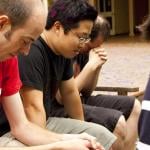PROVERBS 28:9
Again Solomon speaks of our attitude toward torah . The central command of the law was a command to “hear” (Deuteronomy 6). It was a command addressed to the ear. We are to have open ears (Psalm 40; Isaiah 50:5) so that we can obey His commandments. The connection between hearing and obeying is so close that sometimes the Bible uses the verb “hear” as a synonym for “obey.” Not hearing is disobedience; eventually, Israel is sent into exile for “not hearing” the words of the prophets (2 Kings 17:14).
Ears set the direction of our lives. Ears determine which way we turn. Moses warns the people not to turn their hearts toward other gods are refuse to hear (Deuteronomy 30:17).
When we turn our ears to the Word of Yahweh, the word that urges us to repentance, that leads us to turn from a way of wickedness and being to live (Jeremiah 35:15; 44:5). Jesus (Matthew 13:15) and Paul (Acts 28:27) condemn the Jews using the words of Isaiah: Their ear cannot hear, their eyes cannot see, and therefore they cannot understand and their hearts cannot turn back to the Lord.
The thrust of the proverb is to describe the effects of turning our ears from Yahweh’s word in the torah . The one who refuses to hear the law, to listen and obey, becomes an abomination to Yahweh. An abomination, as we’ve often remarked, is something that Yahweh spews from His mouth. Prayers are good; we are commanded to pray, but even good things can become detestable to Yahweh if they are not done in obedience. Solomon has made this point before, contrasting the abominable sacrifice of the wicked with the pleasing prayer of the righteous (Proverbs 15:8).
This is fitting: If anyone refuses to listen to Yahweh, Yahweh will refuse to listen to his prayers. If he turns a deaf ear to Yahweh, Yahweh will in turn a deaf ear to him. Eye for eye, tooth for tooth, deaf ear for deaf ear. That reversal is not confined to our prayers to God. We can find reflections of this in human life. A child who refuses to hear his parents will not be heard by them; an employee who continually bucks his employer’s instructions will have a hard time getting heard; a church member who won’t listen is not going to have much clout with the elders. Open ear meets open ear, but closed ears meet closed ears. That’s the way God made the world.
PROVERBS 28:10
This verse is structured as a chiasm, completed by a brief one-line reversal:
A. Whoever causes-to-stray
B. The upright
C. In the way of evil
C’. In a pit
B’. of his
A’. He will fall.
D. But the perfect inherit good.
The structure underscores the reversal predicted for the anyone who causes people to go astray. At the beginning of the proverb, the one is presumably leading, with enough influence to determine which way the upright will go; at the end of the proverb, he falls. The B sections are perhaps not distinction sections, since “his” is merely a pronominal suffix. If they are seen as separate sections, though, then we have a contrast between the upright’s destiny and the destiny of the one who is causing them to go away from the right way. It’s not the upright who fall into the pit, but their leader. The central section describes the aim, and the actual end, of the one who causes the upright to go astray: He leads them in the way of evil, but at the end of that way of evil is a pit.
What is the picture here? The pit is “his” pit, and that suggests that the man leading the upright astray intended to lead them to destruction. “Come follow me,” he says, as he leads them into a trap. The proverb is saying that the man who leads astray will himself fall into the pit that he’s dug for others (a common theme of cartoons, and the Bible: Psalm 7:15; 57:6; Proverbs 26:27; Ecclesiastes 10:8). The one who leads astray is not hearing torah , which requires a man who digs a pit to cover it and protect against a fall (Exodus 21:23). Instead, this man is trying to lead people to the pit, so that they can fall into it.
Are the “upright” rescued? It seems so. The pit is, again, “his,” and he is the only one who falls (the verb is singular). If we are to link the upright and the “perfect” at the end of the verse, we are given two destinies. The false leader falls, while the upright/perfect are rescued from the pit and inherit good. That suggests an alternative structure:
A. Whoever causes-to-stray the upright in the way of evil
B. In his pit he will fall.
A’. But the perfect
B’. inherit good.
A form of the verb “lead astray” ( shagah ) is used in Leviticus 4:13 to describe sins of wandering or ignorance. This is not a high-handed sin, but a sin of deception, ignorance, confusion. The proverb gives us a specific scenario involving such a sin: A sin of ignorance or wandering may be one that is “caused” by another, that is, one in which we are encouraged by someone we think trustworthy to sin. Sins of ignorance are removed in sacrifice. They are not counted as defiant, high-handed sins. Scripture, in short, recognizes degrees and varieties of sin. Sins are always sins, but sometimes sinners are victims as well as perpetrators.
This not only encourages gentleness in dealing with wandering sinners, but also places a great deal of responsibility on leaders. A leader can cause upright people to go astray; a leader can attempt to lead upright people into a pit, and he’s the one who will fall into it, not them.
Jesus is the upright one. He committed no sin, not even a sin of ignorance or wandering. Still, he took our infirmities and sins on Himself; He took even the infirmities and sins of high-handed sinners who set traps for others. He came to His own to redeem them. Though He never followed the way of evil, He ended up in the pit. But His Father rescued Him from the pit, exalted Him, and He became heir of all things, of all good.
PROVERBS 28:11
Eyes are organs of judgment in Scripture. Everything is open and laid bare before the eyes of the one with whom we have to do. Our true worth and standing is determined by how we stand in the eyes of Yahweh. But we cannot help but make judgments about ourselves. We all use “mirrors” of one sort or another, trying to form a self-judgment. James encourages us to look into the mirror of the law of liberty, and gain an accurate self-judgment there. It is wrong to look at the mirror and then turn away, forgetting what kind of persons we are.
But we’re constantly inclined to do so. We don’t want to look in the mirror of the law, which is going to condemn us. We want to look into the mirror of our own judgment. At the heart of original sin is our refusal to accept God’s evaluation of us; we want to be our own judges, and be right in our own eyes. The wicked “flatters himself in his own eyes” (Psalm 36:2). Proverbs regularly returns to this theme of self-judgment. “Do not be wise in your own eyes” (3:7); the fool thinks he is “right in his own eyes” (12:15); everything sees his own ways are pure (16:2); we are to answer a fool after his folly to keep him from being wise in his own eyes (26:5); a man who is wise in his own eyes is even worse than a fool (26:12); lazy people are wiser in their own eyes than men who answer sensibly (26:16).
28:11 is a variation on this theme, focusing attenti
on not on the fool who is wise in his own eyes, but on the rich man who is wise in his own eyes. Wealth blinds us. Wealth entices us to look not in the mirror of the law but in the mirror of our portfolio. If I’ve made such a bundle of money, the rich man says, I must be something special; I must be very shrewd, very skillful, very wise. Yahweh warned Israel that when they entered the land they would be tempted to take credit for their wealth: “My power and the strength of my hand made me this wealth” (Deuteronomy 7:17).
Solomon says the poor man sees quite through the rich man. A poor man with discrimination and good judgment knows the rich man better than he knows himself. The verb “search” can be used in judicial contexts to mean something like “investigate” (Deuteronomy 13:14; Judges 18:2). The rich man judges himself wise, but the true investigation and evaluation of his worth is not his but the poor man with discernment.
Yahweh is the one who searches out the heart, and tries the reins (Jeremiah 17:10). This takes an interesting twist with the incarnation. For our sakes the God who has all things and made all things became poor. He became the poor but discerning man who rightly evaluates the rich. The incarnate Son judges with the discernment of one who looks from below.















